English

It's a whole mixture. We have students and young people who are playing instruments like violins, flutes and pianos and having lessons, and we also have self-taught drummers or guitarists, percussionists, and those who work with music technology. We bring all those people together. We don't have any auditions and always keep it open. If we have some ensemble which doesn't happen in the traditional orchestras, of 5 flutes, 1 violin, 3 drummers, we will find a way of ensuring everyone can be part of the ensemble.
Yes. We keep inviting children to the next project and it's also word of mouth. One of our aims with 'Connect' is to build up a relationship with young people. Before 'Connect', we had workshops for about 5 weeks, and then we never met them again. Now, we have layers of experience. Some of the children in the ensembles are here for the first time, some have been here with us for 3-5 years, and we have what we call young apprenticeships, who become assistants to us and the students and they help the younger children.
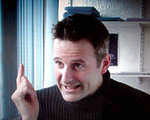
I think the heart of what we do is 'creativity'. What we want to do through that creative process is to give everyone a 'voice'. Whether we are working with Guildhall students or a young person who has never been involved with music before, we want them to start to build up their own musical 'voice', through which they can say something. What we believe is the best way of doing that is doing it not only individually but also together with other people.
The process enables young people to feel confident that they are part of the music making process. Then some of them may decide, 'I want to go further, I want to progress' or for some of them it might just be enough to feel part of this experience. The sense that you are part of the experience gives you confidence as a person and has a positive impact on your life.
We are also interested in the outcome as well as the process. We believe that this process produces very new and exciting music which combines many musical languages and styles, emerges from the young people's own ideas, and has sounds, melodies, rhythms, textures that you've never heard before. It is the collection of the 'voice' of young people.
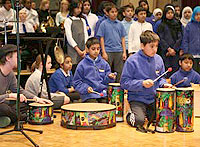
Yes. Presenting classical music is of course a wonderful thing for the young people listening to it, but, for many of them, it might lead to the impression that 'I will never be able to do that. I can't do that'. If they think, by listening to some music, 'This is not for me'. then they might start to think ' I can't do music'. So we want to try to do music in other ways so that they can be part of it. Music is one of the oldest forms of communication, of saying something, expressing something that you can't say in words.
At the heart of music education in the United Kingdom lies the idea that all young people should have the opportunity to hear all types of music, to perform music, and to compose music as well. And I think it needs to be as participatory as possible. So, in 'Connect', we create opportunities where children can compose music, create music, perform music with percussion instruments, their voices, or their own instruments if they play, and we build music up together so they feel part of this experience. We don't just go out and give concerts as one-way performances but we interact and build a musical experience together.

So we want our students here to be as creative as possible. Even if they are training to be classical violinists and read repertoires, we want them to feel confident about improvising, about composing ideas in groups, about having a dialogue, conversation with children, about collaborating with artists from different genres. For the young people, we want them to feel that they can be creative as well. They can have ideas through music even if they don't play an instrument, by building up music together with other musicians.
I think experience is a very important part of this. I think you can't learn just by being taught how to connect with an audience, for example. You have to find your own way of doing it. So, the more you get in the situation, the more you learn how to find your way of connecting and communicating. Musicians are very afraid of making mistakes, but you learn from making mistakes. What is important in our activities is things like risk-taking, taking responsibility, being prepared to listen as well as to contribute ideas, to engage.
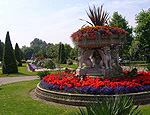
To engage - with other people, and with the process as well - seems to be very easy for musicians. But it often happens that, when you think you are engaging, actually you are not engaging with what's going around you. To sit in an orchestra or an ensemble, are you really engaged with what the rest of the orchestra and what the rest of the music is doing? How completely aware are you of what's happening around you? It's much harder to sit with children with your instruments and to have a conversation and find a meeting point with them.
Exactly. So it's very nice to see that piano teachers and pianists are interested in these activities, and you are finding ways for pianists to engage with young people, like 'Classroom Concerts'. Music education is lifelong learning. Even if you are a skilled pianist, as a musician, you keep learning from your experience and from others.
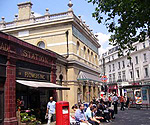
Music education for young people should be about performing, creating and listening, and being involved with as many styles of music as possible so that they can absorb as many different experiences as possible. I think music education should be a combination of formal learning and informal learning which involves the music you listen to and you are inspired by, that you want to know more about. If you are on a classical pathway and are having classical lessons, you should not feel guilty if you are also playing and listening to popular music or jazz. All these things are connected, and they are all of equal value.
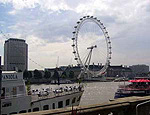
Whether you are going into music or not, you should be given the opportunity to participate in music-making. Those experiences give you confidence as a person. By getting involved with the music-making process, children stand up, communicate and perform something to the audience, to get that response back, and it gives you confidence to interact with other people, and develop your inter-personal skills. And many of those experiences you have in music education, whatever level you are, these give you 'life skills'.
They are transferable to other areas. Even if you don't end up doing music, there are so many skills that you develop through that musical training that you can use in business, in education, in law and in medicine, whatever in life. You should not feel a failure because you did not end up as a top soloist. And what we need to try to stop is, I think, the idea which remains somewhere that you have music performance up here and music education down here, like 'If I don't become a performer, I will become a teacher instead'. We try to bring those together.
Chigusa Futako









